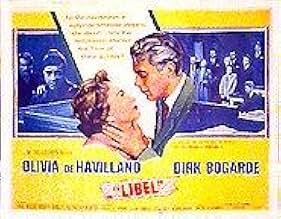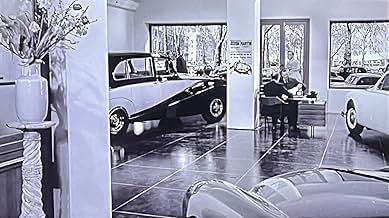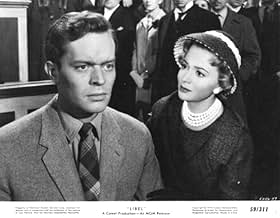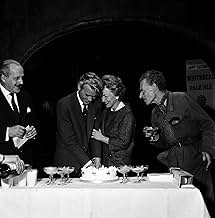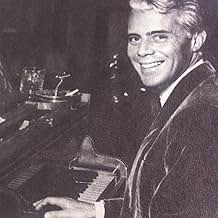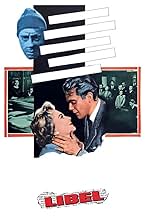PUNTUACIÓN EN IMDb
7,2/10
1,7 mil
TU PUNTUACIÓN
Añade un argumento en tu idiomaA shell-shocked World War II veteran with memory problems is accused of being an impostor by a former comrade.A shell-shocked World War II veteran with memory problems is accused of being an impostor by a former comrade.A shell-shocked World War II veteran with memory problems is accused of being an impostor by a former comrade.
- Dirección
- Guión
- Reparto principal
- Nominado para 1 premio Óscar
- 1 nominación en total
Wilfrid Hyde-White
- Foxley
- (as Wilfrid Hyde White)
Reseñas destacadas
Libel is directed by Anthony Asquith and adapted from Edward Wooll's play by Anatole de Grunwald and Karl Tunberg. It stars Dirk Bogarde, Olivia de Havilland, Paul Massie, Robert Morley, Wilfrid Hyde-White, Anthony Dawson and Richard Wattis. Music is by Benjamin Frankel and cinematography by Robert Krasker.
A shell-shocked ex-WWII prisoner of war with amnesia is accused of being an impostor by one of the guys he was imprisoned with. This sends him spinning into the middle of a Libel court case that could destroy everything in his life.
A splendidly stylish mystery/drama that offers up two Dirk Bogarde's for the price of one. The big question throughout is if Bogarde, in the shoes of Sir Mark Sebastian Loddon, is actually a doppleganger that he was in the war with called Frank Welney. Loddon has the riches, the estate and a beautiful loving wife, Welney was a struggling actor and something of a mischievous imp. The big narrative thrust is that Loddon is not sure himself, he can only remember certain things, thus we are never sure either as the plot twists and turns and the court case simmers away with dramatic force.
Bogarde is great in his dual role, with a voice change for each character and different hair styles to help the viewers differentiate. In the court we have a trio of classy character actors, with Hyde- White and Morley as the opposing lawyers (wonderful to witness this) and Watiss as the judge presiding over the trial. Havilland isn't asked to do much until late in the day, but then she shines bright and puts some emotional punch into proceedings. The great Krasker photographs it in crisp black and white, while Asquith directs with a smoothness that undercuts the coincidences and conveniences that exist in this sort of story.
All the highlights of a court room drama are here, and it's a cracking mystery to boot. 8/10
A shell-shocked ex-WWII prisoner of war with amnesia is accused of being an impostor by one of the guys he was imprisoned with. This sends him spinning into the middle of a Libel court case that could destroy everything in his life.
A splendidly stylish mystery/drama that offers up two Dirk Bogarde's for the price of one. The big question throughout is if Bogarde, in the shoes of Sir Mark Sebastian Loddon, is actually a doppleganger that he was in the war with called Frank Welney. Loddon has the riches, the estate and a beautiful loving wife, Welney was a struggling actor and something of a mischievous imp. The big narrative thrust is that Loddon is not sure himself, he can only remember certain things, thus we are never sure either as the plot twists and turns and the court case simmers away with dramatic force.
Bogarde is great in his dual role, with a voice change for each character and different hair styles to help the viewers differentiate. In the court we have a trio of classy character actors, with Hyde- White and Morley as the opposing lawyers (wonderful to witness this) and Watiss as the judge presiding over the trial. Havilland isn't asked to do much until late in the day, but then she shines bright and puts some emotional punch into proceedings. The great Krasker photographs it in crisp black and white, while Asquith directs with a smoothness that undercuts the coincidences and conveniences that exist in this sort of story.
All the highlights of a court room drama are here, and it's a cracking mystery to boot. 8/10
Having just seen "Libel" on TCM, I was pleasantly surprised....certainly, it is not a great film, but still was very entertaining, and the settings were extremely well done. The story line has been done before, but the acting of some very good English stalwarts plus Olivia de Havilland as an American wife to an English Baron, makes it well worth watching. Dirk Bogarde (never a favourite of mine) does an excellent job in a dual role, and is ably supported by Robert Morley, Paul Massie and Wilfred Hyde-White. There is no doubt that the producers of this film have come up with a film that still stands up today, and be proud of the end result. There are some very clever twists and the use of flash-backs was excellent. I can recommend this to everyone
I unabashedly admit that Dirk Bogarde is one of my favorite actors, so naturally, two of him is better. In "Libel," directed by Anthony Asquith, he has a dual role - that of a baron, Sir Mark Sebastian Loddon, and Frank Welney, an actor and a lookalike in his barracks during World War II. When Mark returns from the war, he can't remember a lot of his past life and is haunted by images of events during the war that he can't connect with. Another soldier sees the baron on television and believes that he is really Frank Welney, and the story is published in a tabloid. Mark's wife (Olivia de Havilland) insists that for the sake of their young son, he sue for libel. He does.
This is an often-told story, but I enjoyed it anyway. Bogarde is excellent as the uptight, insecure Mark and the cocky, nosy Frank, and while there is a strong resemblance between the two men, Welney's coloring and hairstyle is different, as is his manner. De Havilland turns in another marvelous, emotional performance as a woman who starts out believing her husband is indeed the man she loved before the war... and then having her doubts.
Well directed and holds one's interest.
This is an often-told story, but I enjoyed it anyway. Bogarde is excellent as the uptight, insecure Mark and the cocky, nosy Frank, and while there is a strong resemblance between the two men, Welney's coloring and hairstyle is different, as is his manner. De Havilland turns in another marvelous, emotional performance as a woman who starts out believing her husband is indeed the man she loved before the war... and then having her doubts.
Well directed and holds one's interest.
Sir Mark Loddon has been having a hard time of it since he returned from WWII. He was in a German prison camp and then was injured badly during his escape. Everyone, including himself, assumes that his emotional state and spotty memory of things that happened before his escape are due to his wartime trauma. We call it PTSD now, they called it "shell shock" back in the day. He's subject to night terrors and he is always seeing some terrifying reflection in mirrors, water, whatever.
And then along comes somebody from his past, Jeffrey Buckenham, who escaped with Loddon. Buckenham is saying that Loddon is in fact an impoverished actor named Frank Wellney who could have passed for Loddon as far as looks go and who was always trying to find out personal details about Loddon and impersonating him. Wellney, along with he and Loddon, escaped the prison camp together. The three got separated, and (from a great distance) Buckenham witnessed what he believes is the aftermath of the murder of one body double by the other. Only after seeing Loddon on a TV program about famous English castles and noticing that Loddon has the same finger missing as Wellney had has Buckenham decided to come forward with his suspicions.
Buckenham doesn't want blackmail money. Instead, he wants to expose Wellney for the fraud that he is. Buckenham goes to a local newspaper and tells them his tale and the paper prints it, with a great deal of publicity being stirred up since Loddon is quite wealthy and owner of a large manor. Loddon wants to ignore the whole thing and let it blow over, but his wife, Margaret (Olivia De Haviland), says they must sue the paper and Buckenham for libel as otherwise this scandal would always hang over their son. So Loddon becomes a reluctant plaintiff. But why is he so reluctant?
Thus the rest of the film is a courtroom drama with lots of interesting turns including a surprise witness with a story that turns out to have a kind of Frankenstein monster twist to it. The really interesting part of the plot's dynamics is that Loddon was so terribly wounded and shell-shocked in the aftermath of the escape that he himself begins to doubt who he is and what exactly he has done to the missing Mark Loddon, if he in fact is not Mark Loddon himself.
The casting is wonderful. De Haviland is great as a woman who at first completely believes in her husband, but after all of this testimony is beginning to have doubts. Wilfred Hyde-White and Robert Marley are the clever barristers. Anthony Dawson plays Mark's sly cousin who would inherit the entire Loddon estate if it can be proved that the person claiming to be Mark Loddon is an imposter. Finally there is Dirk Bogarde who convincingly plays both the aristocratic Loddon and the oily Wellney as two very different types of people, and also excels at playing whoever the troubled person is sitting next to Olivia De Haviland in the courtroom.
And then along comes somebody from his past, Jeffrey Buckenham, who escaped with Loddon. Buckenham is saying that Loddon is in fact an impoverished actor named Frank Wellney who could have passed for Loddon as far as looks go and who was always trying to find out personal details about Loddon and impersonating him. Wellney, along with he and Loddon, escaped the prison camp together. The three got separated, and (from a great distance) Buckenham witnessed what he believes is the aftermath of the murder of one body double by the other. Only after seeing Loddon on a TV program about famous English castles and noticing that Loddon has the same finger missing as Wellney had has Buckenham decided to come forward with his suspicions.
Buckenham doesn't want blackmail money. Instead, he wants to expose Wellney for the fraud that he is. Buckenham goes to a local newspaper and tells them his tale and the paper prints it, with a great deal of publicity being stirred up since Loddon is quite wealthy and owner of a large manor. Loddon wants to ignore the whole thing and let it blow over, but his wife, Margaret (Olivia De Haviland), says they must sue the paper and Buckenham for libel as otherwise this scandal would always hang over their son. So Loddon becomes a reluctant plaintiff. But why is he so reluctant?
Thus the rest of the film is a courtroom drama with lots of interesting turns including a surprise witness with a story that turns out to have a kind of Frankenstein monster twist to it. The really interesting part of the plot's dynamics is that Loddon was so terribly wounded and shell-shocked in the aftermath of the escape that he himself begins to doubt who he is and what exactly he has done to the missing Mark Loddon, if he in fact is not Mark Loddon himself.
The casting is wonderful. De Haviland is great as a woman who at first completely believes in her husband, but after all of this testimony is beginning to have doubts. Wilfred Hyde-White and Robert Marley are the clever barristers. Anthony Dawson plays Mark's sly cousin who would inherit the entire Loddon estate if it can be proved that the person claiming to be Mark Loddon is an imposter. Finally there is Dirk Bogarde who convincingly plays both the aristocratic Loddon and the oily Wellney as two very different types of people, and also excels at playing whoever the troubled person is sitting next to Olivia De Haviland in the courtroom.
Updated to make the protagonists be World War II veterans instead of World War I, Libel made its Broadway debut in 1935 after a run in London and ran for 159 performances during the 1935-36 season. Playing the role Dirk Bogarde does here was the screen's original Dr. Frankenstein, Colin Clive.
As for Bogarde due to movie screen magic he gets to play two roles, the respected titled English Lord with American wife Olivia DeHavilland and a Canadian fellow prisoner of war who was a traveling player and who looks like him. Worse than that, we see in flashback how he envied him.
Into their happy lives intrudes another former POW Paul Massie who knew both men in the camp and makes the startling accusation that the one stole the identity of the other who died during the war. This indeed is a case of Libel and one for the courts to straighten out.
Bringing the suit on Bogarde's behalf is Robert Morley and defending Massie is Wilfrid Hyde-White, they make a fine pair of antagonists. What is the truth, for that you have to watch Libel.
Though Olivia is first billed, the film clearly belongs to Dirk Bogarde who delivers a fine poignant performance of a man tortured by doubt, there are things tucked away in his mind that he prefers not dealing with. Olivia gets her innings in when even she starts to doubt the identity of the man she's been married to.
This film also gives we Yanks a chance to see Richard Dimbleby who was a combination of Edward R. Murrow and Walter Cronkite, that kind of trusted voice of the British Empire for the BBC. In fact Dimbleby is hosting Bogarde and DeHavilland on a tour of their mansion when Massie spots them on a bar television and sets everything in motion.
Libel holds up very well today it could probably be easily remade for something like the Iraq or Afghan war in about 15 years time.
As for Bogarde due to movie screen magic he gets to play two roles, the respected titled English Lord with American wife Olivia DeHavilland and a Canadian fellow prisoner of war who was a traveling player and who looks like him. Worse than that, we see in flashback how he envied him.
Into their happy lives intrudes another former POW Paul Massie who knew both men in the camp and makes the startling accusation that the one stole the identity of the other who died during the war. This indeed is a case of Libel and one for the courts to straighten out.
Bringing the suit on Bogarde's behalf is Robert Morley and defending Massie is Wilfrid Hyde-White, they make a fine pair of antagonists. What is the truth, for that you have to watch Libel.
Though Olivia is first billed, the film clearly belongs to Dirk Bogarde who delivers a fine poignant performance of a man tortured by doubt, there are things tucked away in his mind that he prefers not dealing with. Olivia gets her innings in when even she starts to doubt the identity of the man she's been married to.
This film also gives we Yanks a chance to see Richard Dimbleby who was a combination of Edward R. Murrow and Walter Cronkite, that kind of trusted voice of the British Empire for the BBC. In fact Dimbleby is hosting Bogarde and DeHavilland on a tour of their mansion when Massie spots them on a bar television and sets everything in motion.
Libel holds up very well today it could probably be easily remade for something like the Iraq or Afghan war in about 15 years time.
¿Sabías que...?
- CuriosidadesThe original Broadway production of "Libel", produced in 1935, was directed by Otto Preminger, years before he made his Hollywood debut as a movie director.
- PifiasIn opening credits, Arthur Davey is listed as In Charge of Adminstration; no way of missing the obvious error - it takes up half the screen; of course, it should be Administration. How can such glaring errors be missed by editors.
- ConexionesReferences Apasionada (1952)
Selecciones populares
Inicia sesión para calificar y añadir a tu lista para recibir recomendaciones personalizadas
- How long is Libel?Con tecnología de Alexa
Detalles
- Fecha de lanzamiento
- Países de origen
- Idiomas
- Títulos en diferentes países
- Libel
- Localizaciones del rodaje
- Piccadilly Circus, Piccadilly, Londres, Inglaterra, Reino Unido(opening scenes, establishing shot)
- Empresa productora
- Ver más compañías en los créditos en IMDbPro
Taquilla
- Presupuesto
- 615.000 US$ (estimación)
- Duración1 hora 40 minutos
- Color
- Mezcla de sonido
- Relación de aspecto
- 2.00 : 1
Contribuir a esta página
Sugerir un cambio o añadir el contenido que falta

Principal laguna de datos
By what name was La noche es mi enemiga (1959) officially released in India in English?
Responde
